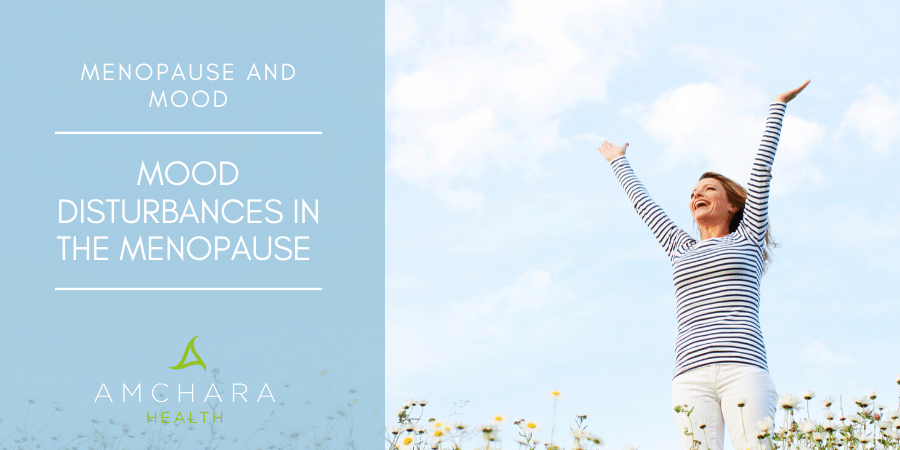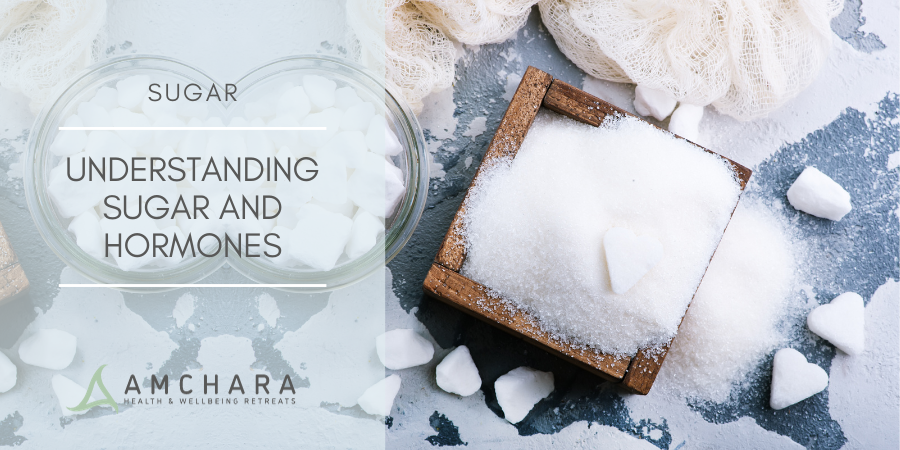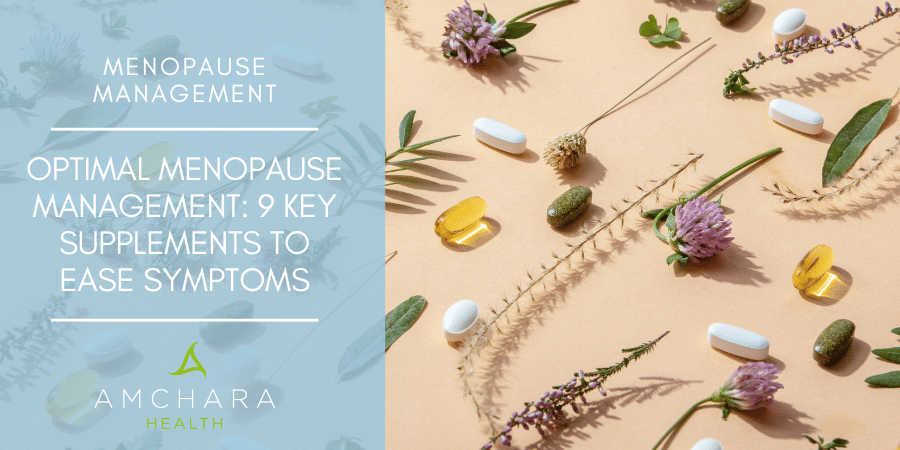Topics Covered in this article:
The menopause signifies the end of a woman’s reproductive life. For some women the transition through to menopause can be smooth with little or no effects, whilst for others the build up to periods stopping can be accompanied with many physical and psychological symptoms.
Although hot flushes and night sweats are often seen as the most common menopause symptoms, the emergence of psychological symptoms such as anxiety, irritability and depression are now known to occur much earlier than physical symptoms.
We’re dedicated to providing you with both insightful information and evidence-based content, all orientated towards the Personalised Health approach. In this article we discuss the link between menopause and mood disturbances and examine how to improve mental and physical health at this time of life.
‘The change’
For many years the menopause has been referred to as ‘the change’, and although some women may feel this term is a little outdated, it quite accurately describes the transition from full reproductive health to the end of reproductive life. During this period many changes occur and each woman will experience these at a different rate or severity.
The onset of the menopause is not sudden – the build up to periods ending can last up to ten years. For some women this perimenopausal stage begins when they are in their mid 40s and periods generally stop after the age of 50. The average age for a woman to reach the menopause in the UK is 51 (1). An early menopause is defined as one starting before the age of 40, and where periods end before the age of 45.
During the perimenopausal stage, before periods end, there can be an increase in psychological symptoms (2) including:
- Irritability
- Nervousness
- Anxiety
- Mood swings
- Depression
- Dysphoria (dissatisfaction with life)
- Loss of concentration
- Memory issues
These can be amongst the first symptoms experienced and research shows that they occur more frequently as the perimenopause progresses. In addition, symptoms of depression have been found to be nearly twice as likely to occur in the early transition phase and tail off in older women, as they get closer to the cessation of periods.
Incidence of menopausal depression
Depression affects around 25% of people in the UK and women are twice as likely to experience depression than men.
During the perimenopause, women are four times more likely to experience clinically significant symptoms of depression and two and a half times more likely to be diagnosed with major depressive disorder than in the premenopausal stage (3).
Women with history of depression are even more susceptible and are five times more likely to be diagnosed with major depressive disorder during perimenopause.
Some research indicates a long perimenopause is also a factor in the development of depression (4).
Why are women more predisposed to mood issues?
Hormones and neurotransmitters share common pathways and receptor sites in areas of the brain which are linked to many functions including mood.
Female hormones fluctuate throughout a woman’s life and oestrogens are known to play an active role in brain development and maintaining brain activity. Oestrogens, notably oestradiol, offer protection for neurons against changes that may alter function (5).
Oestrogens affect the hypothalamus, hippocampus and the cerebellum, where most cognitive functions, motor skills and mood are controlled (6).
The increased risk of mood disorders or depression appears to become more evident after puberty and continues throughout the reproductive life cycle (7). Mood issues are often associated with PMS and the emergence of postnatal depression (PND) demonstrates hormonal involvement in mood (8).
Fluctuations in oestrogens and progesterone also increase the stress response and there may be an increase in stress hormones like cortisol (9). A high cortisol level and dysregulation of the stress response has also been shown to influence the occurrence of depression and anxiety.
Hormonal changes during the transition to menopause
During the initial stage of perimenopause, levels of follicle stimulating hormone (FSH) rise and oestrogens follow. As the perimenopause progresses FSH remains consistently high while oestrogens and progesterone may begin to fall.
During the later stages of the perimenopause, levels of a particular type of oestrogen, oestradiol, may fluctuate wildly. It is thought the increase in FSH and alterations to oestradiol may trigger mood imbalances.
Conventional treatment for menopausal mood issues
As evidence is pointing to the involvement of hormones in the development of depression in the build up to the menopause, this leads to the question of whether hormone replacement will be of use.
Oestrogen therapy for mood issues gives conflicting results. Soares et al (2001) found transdermal oestradiol to be effective for the alleviation of depression (10), whilst Morrison et al (2004) concluded that transdermal oestradiol was not an effective strategy for improving mood (11).
The use of antidepressants also shows mixed results, with some women finding benefit to using antidepressants during the menopausal transition, whereas other women have been shown to respond less to SSRI type antidepressants than men or premenopausal women (12).
Optimising mental health
- Look after your liver
The liver is important for hormone balance and plays a crucial role in eliminating ‘old’ hormones and the clearance of toxins. If the liver is under stress it may impact a variety of functions and have a knock on effect when it comes to hormone balance. This may contribute to the development of menopausal symptoms.
As natural oestrogen levels decline, women become more susceptible to the effects of xenoestrogens, also known as endocrine disrupting chemicals. These are oestrogen mimickers found in commercially raised meat and dairy, pesticides, herbicides, food additives, plastics, food wrap, garden chemicals, air fresheners, perfumes, paints, sunscreens and toiletries. In order to support liver health fully it is best to avoid as many xenoestrogens as possible.
The liver requires several nutrients to function efficiently found in foods such as fruits and vegetables, herbs and spices and good quality protein. Broccoli, cabbage, kale and Brussels sprouts are all rich in compounds that stimulate oestrogen metabolism. Particularly useful foods include parsley, coriander, artichoke, onions, garlic, watercress and turmeric.
- Balance blood sugar
Maintaining an even release of energy from food and drink is essential for supporting your adrenal glands. If blood sugar levels follow a rollercoaster pattern then this can put pressure on the adrenals. During the menopausal transition it is vital to ensure the adrenals are not overworked. Fluctuations in blood sugar also impact brain functioning.
Choose whole grains, eat at least 8 portions of fruit and vegetables each day (with an emphasis on vegetables), include good protein with each meal and don’t forget fat. Good fats are essential and also help to keep appetite and cravings under control. Olives, olive oil, coconut, avocado, nuts, seeds and oily fish are all good sources of healthy fats. Avoid sweet, sugary foods and keep alcohol or caffeine to a minimum.
Aim to eat three meals a day. Some women find they need to snack between meals to balance blood sugar, but there is some research showing that time restricted eating, a form of intermittent fasting, can stabilise blood sugar (13). This involves eating 2-3 meals within a set ‘window’, normally somewhere between 8-10 hours and drinking only water at other times.
- Optimise mood neurotransmitters
A variety of neurotransmitters are involved in the management of mood including serotonin and dopamine. These are derived from protein foods rich in amino acids like tryptophan. Ensuring a good intake of these amino acids allows the body to use them for the production and balance of key neurotransmitters. Several nutrients are also required as co-factors for neurotransmitter function.
Good choices include eggs, salmon, turkey, chicken, cottage cheese, tofu, bananas, blueberries, dark green leafy vegetables and nuts and seeds.
- Support gut health
Good gut health is essential for digestion and absorption of nutrients, and the elimination of wastes, as well as impacting hormone balance and mood. The gut houses over 2 kg of organisms known as the microbiome. This diverse population of bacteria, yeasts and viruses synthesise vitamins, convert foods into active compounds and send signals to the brain.
Establishing a good variety of species within the gut is important and this may be achieved through the use of a high quality probiotic. Foods that feed the microbiome include fibres in fruits, vegetables, nuts seeds, legumes and whole grains.
Including fermented foods like tofu, tempeh, miso, sauerkraut and kombucha are also supportive of good gut health.
- Consider herbal support
Herbs can offer additional support for symptoms during the menopause transition. Many herbs offer ‘adaptogenic’ properties, meaning they help the body adapt better to changes.
Rhodiola and ashwagandha are traditional remedies for fatigue, mood issues and stress. They offer adrenal support and have been shown to support neurotransmitter function and regulate the stress response (14).
St John’s Wort, traditionally used for depression, seems to work in several ways and may also be useful during the menopause. A combination of St John’s Wort and black cohosh may aid in alleviating mood issues as well as hot flushes (15).
- Lifestyle alterations
Maintaining a good level of physical activity, managing stress and sleeping well all have a positive influence on menopause as well as mood.
Taking a daily walk in the morning can relieve stress, get your blood flowing and set the inner body clock, allowing for better sleep. Exercise classes, swimming and cardiovascular sports three or more times a week supports good mood. Add in some weights to protect bone health.
Visualisation, meditation and mindfulness are all clinically proven to improve mental health and curb the stress reaction. They can improve your outlook on life, boost motivation and enjoyment.
Find what works for you, you may wish to try some new activities with friends or make new friends along the way – social interaction plays a large role in mental health.
Takeaway
Although evidence shows women going through the menopause have a higher risk of developing depression, it can be prevented.
An understanding of factors that may increase risk can be beneficial and taking actions to support mental health can help reduce the impact of symptoms experienced.
If you would like to know more about to have a healthy menopause, or are experiencing symptoms, then a 1-2-1 consultation with an experienced Amchara Personalised Health Practitioner can help. Using functional medicine principles and state of the art tests, your practitioner can evaluate hormone balance and provide a personalised programme for health improvement.
This doesn’t need to be the end of the article!
With your comments we’d love to continue the conversation.
Let us know your strategies for tackling mood issues during the menopause.
Please leave your comments below.
Read this next:




